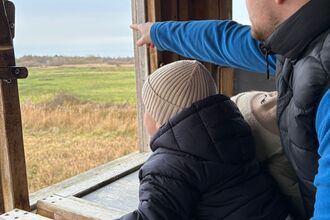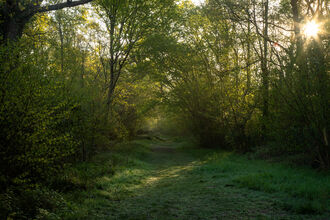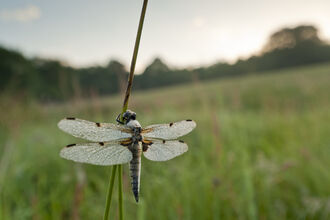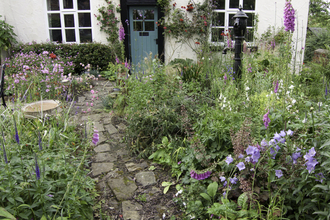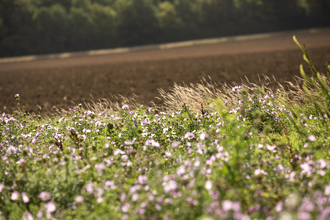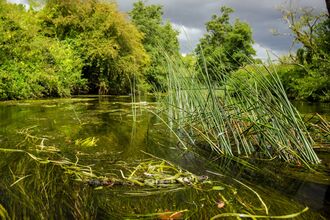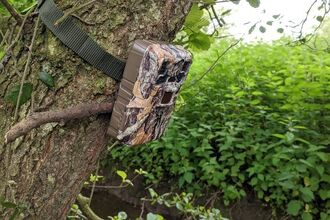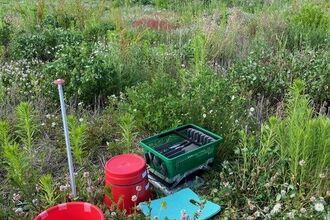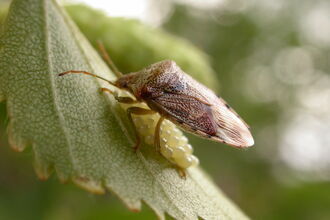News

Outreach and engagement grantsProviding funding of up to £2,000 for individuals, teams and organisations to engage public audiences with the excitement of ecological science. Objectives
All Grants must be for projects that meet at least one of the top-level BES aims:
Whilst all forms of outreach and engagement will be supported, the funding may have the greatest impact if the Grant particularly encourages applications for activities that achieve the following:
|

The Linder Foundation GrantsThe Linder Foundation support specific projects that focus on land-based projects relating to biodiversity (such as sustainable farming practices) and/or species preservation/re-introduction. The project can be in an urban or rural environment, can be farm-based or within connected farms, and could contain a research element that seeks to provide the evidence base for change. Our average grant is £15,000 and their grant should cover at least 50% of the total project cost. Priorities
Visit Linder Foundation website |

Are you interested in taking part in a Suffolk bat survey?The surveys involve installing static/remote detectors at a fixed location in your garden or local space for up to a week. Bats passing in the vicinity of the microphone will be recorded from sunset to sunrise for the duration of the survey. Recorded bat calls are analysed using the BTO acoustic pipeline, followed by manual verification of the species. Vocalisations of any other small mammal species detected (shrews, mice, voles) will also be identified. The results will be sent to you and SBIS. The surveys aim to gather bat data from locations that might otherwise be under-recorded to increase the distribution data for bats in the county. For more information, contact Huma Pearce, [email protected] |

Spot a hog!Spot a Hog is a citizen science study that aims to test the potential of using data obtained from privately owned camera traps for monitoring hedgehogs and estimating their density. It will be using a novel method that requires a calibration step, for the study team to be able to extract the metrics necessary for the population size modeling. The West European Hedgehog is a species of conservation concern in the UK, as its population has been undergoing a historic decline. To identify the reasons for, and the extent of, this decline data from across the country is needed. Camera traps, or trail cameras, are widely applied in wildlife monitoring. Some amazing initiatives, such as the National Hedgehog Monitoring Programme, uses camera traps to estimate the density of various species. However, camera traps are also increasingly used by private users to observe wildlife in their gardens. This data holds great potential for monitoring urban species, as it can provide information on multiple species in a habitat often not represented in scientific studies. This is also an especially important habitat for hedgehogs, as currently they are more frequently observed in urban than in rural areas. The novel method used in this study requires some additional steps to work out how animals move in front of the camera, and that’s where you come in! The study welcomes anyone who already has a camera trap (or will get one before the start of the survey) in May 2025. You will need to set up your camera according to a protocol available on the website, calibrate the camera following the instructions, and leave it on for a maximum of 1 month. After this, you will need to upload the images to a designated project on MammalWeb. The images will then be available to the public for spotting (i.e. classifying images by species) and the results will be analysed by the project team. Further information can be found on the Spot a Hog website as well as how to sign up. You can also download an information sheet. |
Events
|
Volunteering with Dedham Vale National Landscape: Woodland Planting
Dedham |
|
Volunteering with Suffolk Coast and Heaths National Landscape: Hedge planting
Hemley |
|
Mammal Society: Pine Marten: Monitoring and Ecology |
|
Mammal Society: Advanced eDNA Survey Design and Data Interpretation for Mammal Monitoring |
|
Suffolk Wildlife Trust: Wildlife Live Webinar - White Tailed Eagles
Online webinar |
|
Royal Entomological Society: Entographica: The Invertebrate-Inspired Art Exhibition – External Event
Entographica, an exhibition of invertebrate inspired art from the Entographic Collective. Bath Royal Literature and Science Institute, Queens Square, Bath, UK. A diverse range of invertebrate portraits from 15 artists, ranging from glass carbide beetles to delicate… |
|
Suffolk Wildlife Trust: Wildlife Walk Wednesday 11 February 2026 |
|
London Natural History Society: Awakening to Birds at 'The Wakes': Gilbert White by John Rumm |
|
Suffolk Wildlife Trust: Talk: Helping house martins Thursday 12 February 2026 |
|
Suffolk Wildlife Trust: Family Guided Walk
Saturday 14 February 2026 |
|
Biological Recording Company: Mapping the Beetle Tree of Life |
|
Volunteering with Dedham Vale National Landscape: Coppicing
Alphamstone |
|
Biological Recording Company: Deploying Camera Traps |
|
Volunteering with Suffolk Coast and Heaths National Landscape: Ringed Plover Fence Erection
Shotley |
|
Mammal Society: Introduction to Stoats and Weasels: Ecology and Behaviour |
|
Biological Recording Company: Shades of Grey: Industrial Melanism in Spiders |
|
Suffolk Wildlife Trust: Wildlife Live Webinar - Ancient Woodland in Suffolk
Tuesday 24 February 2026 |
|
Royal Entomological Society: Aquatic Insects Special Interest Group (SIG) 2026
Aquatic Ecosystems in the Data Age Date: Thursday 26 February 2026 (9.30am - 3.30pm) and Friday 27 February 2026 (9.30am - 12.30pm) Venue: Online Our Aquatic Insects Special Interest Group event brings together researchers, conservation practitioners and… |
|
Royal Entomological Society: Verrall Lecture 2026
The Verrall Lecture is an annual public event organised by the Royal Entomological Society. It is open to all, free to attend and hosted in central London. |
|
Volunteering with Dedham Vale National Landscape: Tree Guard Removal
Higham |
|
Biological Recording Company: Antarctic Invertebrates: Diversity and Threats |
|
Volunteering with Suffolk Coast and Heaths National Landscape: Hedge Planting
Walberswick |
|
Volunteering with Suffolk Coast and Heaths National Landscape: Ringed Plover Fence Erection
Shotley |
|
Mammal Society: Introduction to Large Mustelids: Monitoring and Project Coordination |
|
Biological Recording Company: Exploring Underwater Scilly |
|
Suffolk Wildlife Trust: Talk: Flora & Fauna of Namibia Tuesday 10 March 2026 |
|
Biological Recording Company: Making the Most of Bird Sounds |
|
Suffolk Wildlife Trust: Talk: Foxearth Meadows nature reserve
Wednesday 11 March 2026 |
|
London Natural History Society: Britain's Best Known Plant Extinction: Summer's Lady's-tresses R. Kulczycki |
|
Volunteering with Dedham Vale National Landscape: Hedge Aftercare/ Gapping up
Alphamstone |
|
Suffolk Wildlife Trust: Talk: Climate change, gardening and us
Thursday 19 March 2026 |
|
Suffolk Wildlife Trust: Wildlife Live Webinar - Wilder Landscapes in action
Online webinar |
|
Mammal Society: Annual Conference (Online) |
|
Mammal Society: Nature Writing Workshop |
|
Royal Entomological Society: Student Forum 2026
Student Forum 2026 Monday 30 – Tuesday 31 March, 10:00 – 17:00Newcastle University We are delighted to announce details for our 2026 Student Forum! This annual two-day event run by the Royal Entomological Society’s student… |
|
Suffolk Wildlife Trust: Talk: Wildlife along the Stour Wednesday 8 April 2026 |
|
London Natural History Society: Virtual Talk TBC |
|
Suffolk Wildlife Trust: Blyth Valley & Southwold Wildlife Group AGM & Film on canoeing down an East Anglian river
Thursday 9 April 2026 |
|
Suffolk Wildlife Trust: Talk: Gulls - more than just chip thieves
Tuesday 14 April 2026 |
|
Royal Entomological Society: Infection, Immunity & Microbionts Special Interest Group (SIG)
Infection, Immunity & Microbionts Special Interest Group (SIG) Date: Thursday 16th - Friday 17th April 2026 Venue: Milner Centre for Evolution, University of Bath Join our Infection, Immunity & Microbionts Special Interest Group for a… |
|
Suffolk Wildlife Trust: Talk: The future of barn owls in Suffolk
Thursday 16 April 2026 |
|
Suffolk Wildlife Trust: Talk: Languard Nature Reserve
Tuesday 21 April 2026 |
|
Suffolk Wildlife Trust: Talk: Wild about Suffolk - Trail camera footage
Wednesday 29 April 2026 |
|
Suffolk Wildlife Trust: Workshop: Spring wildlife photography
Saturday 9 May 2026 |
|
Royal Entomological Society: Insect Hour: Pesticides, dogs & insect declines
Insect Hour: Pesticides, dogs & insect declines Welcome to the first event in our online talk series exploring Grand Challenges in Entomology. Insect Hour will be held every second Wednesday of the month* from 1pm-2pm… |
|
London Natural History Society: Saving the Stone Curlew by Keith Betton |
|
London Natural History Society: Bringing Beavers Back to London: The Ealing Beaver Project by Şeniz Mustafa |
|
Royal Entomological Society: Insect Week 2026
Get involved Find an event Visit the Insect Week Events page to find an event near you during Insect Week. We will be listing some of these nearer the time. Planning an event during Insect… |
|
Royal Entomological Society: XIII European Congress of Entomology – External
Welcome to ECE 2026 Join us in Tours, France, in the heart of the Loire Valley, from June 29 to July 3, 2026 for the XIII European Congress of Entomology. Building on a rich tradition… |
|
Suffolk Wildlife Trust: Photography Workshop: Macro masterclass in summer
Saturday 4 July 2026 |
|
Suffolk Wildlife Trust: Wildlife Live Webinar - Soil ecoacoustics
Online webinar |
|
Suffolk Wildlife Trust: Photography workshop: Macro masterclass in autumn
Saturday 7 November 2026 |
|
Suffolk Wildlife Trust: Wildlife Live Webinar - Bugs, who needs them?
Online webinar |








